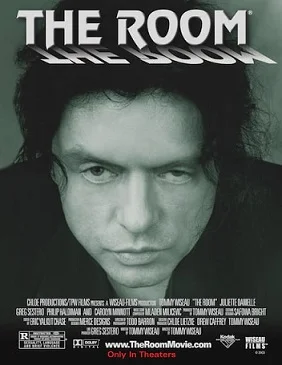The Films That Cut Both Ways - The Room
By Samuel Jeffries
What if an alien, with no preconceived notions of human interaction, wrote and directed a movie? No, that isn’t the plot of The Room. Instead, it is the only possible way I can justify how this… masterpiece exists. Written, directed and starring Tommy Wiseau, The Room was supposed to be a modern day tragedy focusing on the rapid decline of a loving relationship. That is what it was supposed to be. What you get instead is a strange amalgamation of scenes, many of which lack cohesion, while some seem to have no purpose whatsoever! Yet, despite how terrible this sounds (and believe me, it’s a horrifying film), it still somehow manages to be a work of genius.
Most of this hilarity focuses around the confusing and alien acting of the main character, Johnny. Played by the legendary Tommy Wiseau himself, the visionary director acts as if he’s never interacted with another human being in his life. He laughs in almost every scene, repeats the same dialogue on a number of occasions and even randomly asks his best friend Mark (Greg Sestero) about his “sex life”. I couldn’t stop laughing whenever he would speak as everything that came out of his mouth was simply so absurd! Amplify this through Wiseau’s own original script and you’ve got an entire cast of aliens throwing around an American football (?) and spouting disconnected plot. There’s even a point when one of the characters just states she has breast cancer, and the illness is never brought up again.
At times I couldn’t help but think that this whole film had to be satire. It had to be! There were moments that I believed it had actually become self aware, especially with the presence of Johnny’s psychologist friend, Peter (Kyle Vogt). The character is reminiscent of Frank Grimes from the Simpsons episode `Homer's Enemy’, who acts as the only rational person in Springfield and is driven insane by the madness of it all. It was incredible to have this one sane character, this one guiding light, a seeming reprieve from the insanity. But, all of a sudden you realise…the actor for this character changes half way through the film! AND he is called another name! According to records, Vogt was unable to return to play Peter regardless of Wiseau’s remaining lines for the character. So, Wiseau chose instead to give the lines to Steven (Greg Ellery). Who’s Steven? No one knows! He suddenly appears and acts as if he’s been a character in the film the whole time.
The most boring areas of the film are, unfortunately, the myriad of sex scenes spread throughout the run time. IMDB says there are 3 major sex scenes and a few ‘not-quite’ scenes. I would have personally noted how many there were if my soul had not left my body every time one started; and you would forgive me for not returning to recount. However, despite their tedious nature, I believe they are outweighed by the unintentional genius of the rest. One of the not-quite sex scenes is one of the funniest moments in the film, simply due to the facial expressions of the actor, Mike Holmes.
Whilst watching, I slowly began to be drawn further and further into the narrative. This wasn’t because it was secretly good or deep; it’s not. But, it’s because I believe I’ve glimpsed the mind of this Lovecraftian beast named Wiseau. Perhaps I’m mad, insane or looney, but I can see the very basic line work of an American tragedy. The plot of the movie itself is about the destruction of Johnny’s world as his fiancée, Lisa (Juliette Danielle), cheats on him with his best friend, Mark. This mirrors the narrative of another, more famous work: The Arthurian Legends. The triangle of Johnny, Mark and Lisa is, arguably, very similar to that of Arthur, Lancelot and Guenivere. Do I believe that Tommy Wiseau is capable of literary parallels? As I said, I’ve only glimpsed the mind of this maddening monster. However, it is somewhat eye-opening to learn that Tommy wrote the original script as a play and states that his background is in theatre. He also claims that his inspiration came, partly, from Tennessee Williams, who was most well known for his tragedies based on the folly of the American Dream. With this information, it’s difficult to ignore the startling parallels between The Room and American Tragedies. In a number of cases, the movie follows the same beats as a number of Williams’ works: A large interconnecting cast, a tragic ending caused by the betrayal of another, a focus on sexuality and sensuality, and drama, drama, drama! One may not be as well executed as another but there is no denying the presence of impressive artistic style obscured within intricate ineptitude.
Wiseau has, retroactively, attempted to suggest that The Room was always meant to be a comedy. However, anonymous cast and crew have argued against this and have stated that it was attempting to be a drama. Ultimately, it doesn’t matter either way. Was it intentional? Then Wiseau discovered the holy grail. It wasn’t? Then he stumbled upon it in the dark. Every director, script-writer and actor aims to have their movie memorialised and glorified, and it will be a long time before The Room is ever forgotten. Wiseau is going to have that glory by the plastic spoonful.
I chose to review The Room because it is easily the most approachable and well-known ‘good-bad’ movie to exist. If one has never heard of or seen The Room, then I absolutely recommend you do. It is an experience you will never forget.






